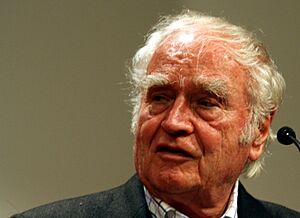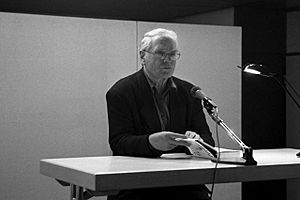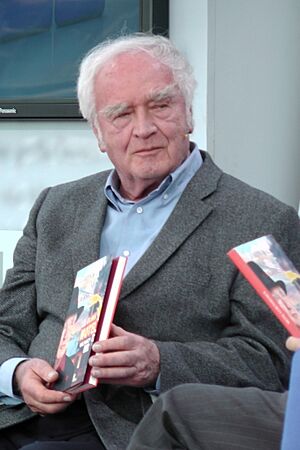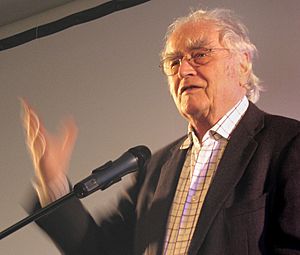Martin Walser facts for kids
Quick facts for kids
Martin Walser
|
|
|---|---|
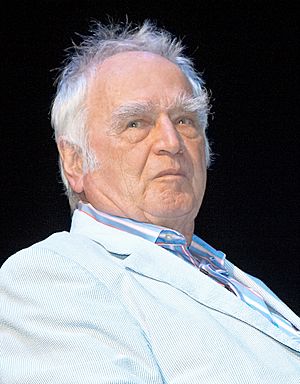
Walser in 2007
|
|
| Born | 24 March 1927 Wasserburg am Bodensee, Bavaria, Germany |
| Died | 28 July 2023 (aged 96) Überlingen, Baden-Württemberg, Germany |
| Occupation | Novelist |
| Education | University of Regensburg University of Tübingen |
| Period | 1955–2023 |
| Notable works | Runaway Horse |
| Notable awards | Georg Büchner Prize 1981 Peace Prize of the German Book Trade 1998 |
| Signature | |
Martin Walser (born March 24, 1927 – died July 28, 2023) was a well-known German writer. He wrote many novels, plays, and stories during his long career. He was famous for his clear writing style and for exploring the lives of ordinary people in Germany.
Contents
About Martin Walser's Life
Martin Walser was born in a town called Wasserburg am Bodensee, which is next to Lake Constance in Germany. His parents ran a business selling coal and also owned an inn near the train station. He wrote about his childhood in his novel Ein springender Brunnen, which means A Gushing Fountain.
From 1938 to 1943, he went to secondary school in Lindau. During World War II, he served in an anti-aircraft unit, which helped defend against enemy planes. When he was 17, in 1944, he became a member of the Nazi Party. Walser later said he didn't know he was joining, but some historians disagree. By the end of the war, he was a soldier in the German army, called the Wehrmacht.
After the war, he went back to school and finished his Abitur (a final exam to qualify for university) in 1946. He then studied literature, history, and philosophy at the University of Regensburg and the University of Tübingen. In 1951, he earned his doctorate degree in literature. His main project was about the writer Franz Kafka.
While he was studying, Walser also worked as a reporter for a radio station called Süddeutscher Rundfunk. This is where he started writing his first radio plays, which are stories made for radio. In 1950, he married Katharina "Käthe" Neuner-Jehle. They had four daughters: Franziska Walser became an actress, Alissa Walser is a writer and painter, and Johanna Walser and Theresia Walser are also professional writers. Johanna sometimes worked with her father on writing projects.
Starting in 1953, Walser was often invited to meetings of a famous German writing group called Gruppe 47 (Group 47). In 1955, this group gave him an award for his story Templones Ende. His first novel, Marriage in Philippsburg, came out in 1957 and was very successful. After this, Walser became a full-time writer. His most famous work is a novella (a short novel) called Runaway Horse, published in 1978. It was popular with readers and critics.
In 1981, Martin Walser received the Georg Büchner Prize, which is a very important award for German writers.
In 2004, Walser changed publishers, moving from Suhrkamp Verlag to Rowohlt Verlag. This was unusual because he was able to take the rights to all his past books with him. He said he made the change because his old publisher didn't support him enough during a disagreement about his novel Tod eines Kritikers (Death of a Critic).
Walser was a member of several important arts and language academies in Germany, including the Akademie der Künste (Academy of Arts) in Berlin. In 2007, a German magazine called Cicero ranked him as the second most important German intellectual, right after Pope Benedict XVI.
Martin Walser passed away on July 28, 2023, at the age of 96.
Martin Walser's Political Views
Martin Walser was also known for his involvement in politics. In 1964, he attended the Frankfurt Auschwitz Trials, which were important trials for people involved in the Holocaust. This helped shape how West Germany thought about its past. He also joined protests against the Vietnam War.
In the late 1960s and 1970s, Walser supported Willy Brandt, who later became the leader of West Germany. During this time, Walser was seen as leaning more towards the left side of politics. He was friends with some German thinkers who followed Marxist ideas and even visited Moscow. However, by the 1980s, Walser's political views began to shift more towards the right. He gave speeches where he expressed his sadness about Germany being divided into East and West. He also wrote about this topic in his story "Dorle und Wolf".
Peace Prize of the German Book Trade
In 1998, Walser received the Peace Prize of the German Book Trade. This award is given to people who have done important work for peace. His acceptance speech caused a lot of discussion among German thinkers. He talked about how Germany remembers its history and how that affects politics today.
Death of a Critic Controversy
In 2002, Martin Walser published a novel called Death of a Critic. In this book, he strongly criticized a very famous German literary critic named Marcel Reich-Ranicki. The book caused a big public debate even before it was fully released. A newspaper editor, Frank Schirrmacher, wrote an open letter to Walser saying his newspaper would not publish parts of the book because it seemed like a "document of hate." Other newspapers took sides, with some supporting Walser and others supporting Reich-Ranicki.
Martin Walser's Works
Here are some of the books Martin Walser wrote, with their English titles if they were translated:
- Ein Flugzeug über dem Haus und andere Geschichten (1955)
- Ehen in Philippsburg (1957) – The Gadarene Club (1960) / Marriage in Philippsburg (1961)
- Halbzeit (1960)
- Eiche und Angora: Eine deutsche Chronik (1962) – The Rabbit Race (1963)
- Das Einhorn (1966) – The Unicorn (1983)
- Der Abstecher, Die Zimmerschlacht (1967)
- Ein Kinderspiel: Stück in zwei Akten (1970)
- Fiction: Erzählung (1970)
- Die Gallistl’sche Krankheit (1972)
- Der Sturz (1973)
- Jenseits der Liebe (1976) – Beyond All Love (1983)
- Ein fliehendes Pferd (1978) – Runaway Horse: A Novel (also 1978)
- Seelenarbeit (1979) – The Inner Man (1984)
- Das Schwanenhaus (1980) – The Swan Villa (1983)
- Brief an Lord Liszt (1982) – Letter to Lord Liszt (1985)
- Brandung (1985) – Breakers: A Novel (1988)
- Meßmers Gedanken (1985)
- Dorle und Wolf: Eine Novelle (1987) – No Man’s Land (1988)
- Jagd: Roman (1988)
- Die Verteidigung der Kindheit: Roman (1991)
- Das Sofa (written 1961) (1992)
- Ohne einander: Roman (1993)
- Vormittag eines Schriftstellers (1994)
- Finks Krieg: Roman (1996)
- Ein springender Brunnen: Roman (1998) – A Gushing Fountain (2015)
- Der Lebenslauf der Liebe: Roman (2000)
- Tod eines Kritikers: Roman (2002)
- Meßmers Reisen (2003)
- Der Augenblick der Liebe: Roman (2004)
- Angstblüte: Roman (2006)
- Der Lebensroman des Andreas Beck (2006)
- Ein liebender Mann: Roman (2008)
- Mein Jenseits: Novelle (2010)
- Ein sterbender Mann (2016)
- Statt etwas, oder Der letzte Rank (2017)
Selected Films Based on His Works
Many of Martin Walser's stories and plays have been made into films or TV shows:
- Der Abstecher, directed by Günter Gräwert (1962, TV film)
- Eiche und Angora, directed by Rainer Wolffhardt (1964, TV film)
- Die Zimmerschlacht, directed by Franz Peter Wirth (1969, TV film)
- The Unicorn, directed by Peter Patzak (1978)
- The Fall, directed by Alf Brustellin (1979)
- Runaway Horse, directed by Peter Beauvais (1986, TV film)
- Ohne einander, directed by Diethard Klante (2007, TV film)
- Runaway Horse, directed by Rainer Kaufmann (2007)
Screenwriter
Martin Walser also wrote screenplays for films and TV series:
- Chiarevalle wird entdeckt, directed by Hannes Tannert (1963, TV film)
- Havoc, directed by Peter Fleischmann (1972)
- Weak Spot, directed by Peter Fleischmann (1975)
- Tatort: Armer Nanosh, directed by Stanislav Barabáš (1989, episode of the TV series Tatort)
- Tassilo, directed by Hajo Gies (1991, TV series, 6 episodes)
See also
 In Spanish: Martin Walser para niños
In Spanish: Martin Walser para niños
 | Stephanie Wilson |
 | Charles Bolden |
 | Ronald McNair |
 | Frederick D. Gregory |


